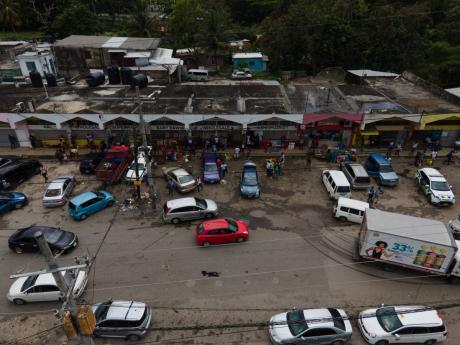Michael Witter | Neglect of the people’s business
The market was dinghy, dark, rundown, dirty, and hot. The people there – the sellers, the hangers-on, the passers-through, the few apparent buyers – are dressed in old, tattered clothes that are put together like costumes for a play set in a time long gone. They speak Jamaican, with local pronunciations, as if this is their only language. The only modern technology in the market is the cell phone.
It is the same in all the parochial markets, to varying degrees. The St Ann’s Bay market is so hot, dark, dirty and rat-infested that the food vendors set up make-shift stalls on the sidewalks, until the parish/municipal council pushes them off the street. Prices are higher to cover the losses to spoilage and pests. For decades, the Papine market has had piles of garbage and regular flooding. After the uprising around the arrest of Dudus in 2010, corporate interests financed a well-needed facelift for the Coronation Market. A new refurbishing is long overdue for this market through which an estimated 70 per cent of the domestic food supply passes weekly.
The faces of the people reveal their simple, hard lives, lived one-and-one with Nature, with very limited education and disconnected from formal Jamaican society. When our political leaders speak, it is not to them, nor about their issues, except at election time to solicit their votes.
In the wake of Hurricane Beryl, the domestic food supply is now narrowly limited, with everyone selling the same limited range of root crops – yams, potatoes, carrots – and a few hardy vegetables like cabbage. Choices are extremely limited and expensive.
When I visited the market, I had just heard that the minister of finance had been rewarded by the International Monetary Fund (IMF) for his excellent work. I wondered how, under his watch, the total expenditures allocated to physical and social infrastructure to benefit ordinary Jamaicans compared to the aggressive debt payments to the IMF and other debtors.
The people in the market know only these conditions. Sixty-two years after Independence, occasional painting, minor repairs, and cleaning are all that governments have afforded to the central place for the distribution of the domestic food supply. Can there be a clearer statement of how unimportant the ordinary people are in public policy? So far, very little of the promised progress has trickled down, and primarily to the aggressive citizen prepared to appropriate what s/he needs for survival.
TRAFFIC CONGESTION
This market is in the centre of a town in which traffic congestion is the norm. At mid-morning on a weekday, pedestrians overtake cars in traffic along the main street as trucks and cars scrape by each other. Suddenly, a taxi does a quick three-point turn, forcing traffic in both directions to yield. No horns are blown in protest; apparently, it is not surprising. Blended in this streetscape of disorder, a vagrant, whom we call mad and the Americans call homeless, wanders in his tatters, talking to no one in particular and bending to pick up what he alone notices.
The town itself is in desperate need of repair and organisation.Really, the market fits in perfectly with the overall conditions and ambience. There is much to learn from other societies where infrastructure is clean and in good condition and citizens contribute to maintaining good order. In Jamaica, we ignore the disorder and filth around us to keep our sanity instead of being uplifted by order and cleanliness. Kigali, the capital of Rwanda, is a model of rapid transformation into a modern, pristine city that we could emulate.
In the long halts of traffic, the condition of the market and the town haunted my mind. My guess is that the same people in the market with an almost forlorn look on their faces, and the drivers and pedestrians with miserable and stressed faces would see Dr Clarke’s ‘flying out’ as being positive for him, like anyone else. They have become too cynical to hold him to his sworn responsibilities and the government’s promises. It is naïve to think that the people’s business is the government’s priority instead of an empty campaign promise. “A so di system set” to serve the interests of the IMF and every other body and individual whose business is to take what wealth they can out of Jamaica. Dr Clarke is doing what many people in the market and the town want to do.
Later that day, I learned that 36 per cent of our students passed mathematics in the CXC exams. Teachers, principals and the minister of education must have known that a disaster was looming. Maybe they did not tell the prime minister. Certainly, there is no report of him intervening before the exams, nor since the results came out. Our low-performing students are not prepared for productive occupations in this era of rapid technological change. Not only food for the body, but food for the minds of our young people is in a “state of chronic”, as a former spokesman for the public transport sector once characterised it.
The poor exam results have already receded to the back of public attention with the switch of focus to starting the school year. As important and necessary as the repairs are, especially after Hurricane Beryl, it is the curriculum, the teacher training, the educational resources and parental support that need prioritisation to improve the performance of our students in mathematics and languages. The official silence is both eerie and depressing; the absence of leadership is inexplicable and inexcusable.
Michael Witter is a research economist focusing on sustainable development issues. Send feedback to columns@gleanerjm.com

